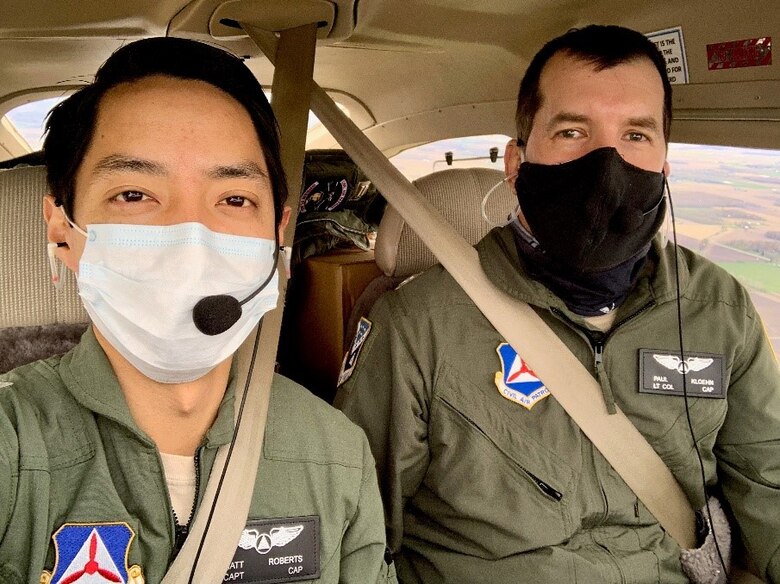The Civil Air Patrol, the official auxiliary of the U.S. Air Force, is assisting with Michigan's response to the COVID-19 pandemic.
CAP's Michigan Wing has partnered with Michigan State Police, who handle emergency management and lead the state emergency operations center. The wing was available with resources from the moment the center was set up in response to the pandemic.
To date, the state of Michigan has requested four types of support from CAP, and every request has been approved by the Department of Defense via First Air Force. The first two requests involved transporting COVID-19 test kits, personal protective equipment and other urgently needed material to a variety of cities in Michigan.
"In challenging times like these, we're proud to be able to help the people of Michigan through our auxiliary Air Forces," said Joe Sanders, National Security and Preparedness Center deputy director, 1st Air Force, Air Forces Northern, headquartered at Tyndall Air Force Base. "With the dedication and expertise of these volunteer citizen Airmen, our response would not be as fast or effective."
The Michigan State Police requested CAP's assistance in transporting COVID-19 test kits throughout Michigan because they could "quickly, efficiently and effectively meet the needs of the state of Michigan," said Capt. Christopher Jones, Michigan Wing CAP public affairs officer.
Members have carried out multiple flights across the state in the wing's 10 available single-engine planes, delivering test kits and picking up kits that require processing.
"We were able to transport COVID test kits to the Upper Peninsula," said Col. Rajesh Kothari, Michigan Wing commander. "Michigan Wing CAP aircrews delivered test kits to Sawyer International Airport (Michigan) last week. We picked up completed kits less than a week later to return them to the state laboratory in Lansing (Michigan) for testing."
The mission marked the first delivery of live test kits to the state laboratory.
"We plan to assist with multiple missions a week," Jones said. "So far, we have flown over 400 test kits from various parts of the state to the laboratory for processing."
CAP is known for its planes, but it has many other capabilities to help the state during the pandemic response.
In late March, the state had exhausted most of its qualified incident management team members and asked CAP to provide an unpaid staff member for the TCF Regional Care Center in Detroit. TCF is a 1,000-bed field hospital erected in the city's largest convention center to handle COVID-19 patients.
CAP assumed overall incident command there this month, Jones said.
The amount of work and volunteer hours continue to grow as more responsibilities are shifted to CAP.
"We have provided a demobilization leader and check-in supervisor at the TCF," Kothari said. "Beginning on May 8, our volunteer Airmen have been asked to take over staffing of the incident command post for the next two-week (IMT) cycle. To date, CAP has provided over 200 volunteer man-hours in support of these taskings."
With the aerial missions and TCF support mission established, the Michigan Wing stands ready to further support the states while relationships continue to develop between CAP and Michigan.
Acting as a Total Force partner and the auxiliary of the Air Force, Civil Air Patrol is aligned with First Air Force to rapidly respond to non-military threats domestically when tasked in a Defense Support of Civil Authorities capacity to save lives, relieve suffering, prevent property damage and provide humanitarian assistance.
"Other ways the Civil Air Patrol supports our communities around the country is through conducting search and rescue missions, low-level route surveys, aerial photography, disaster relief, counterdrug surveillance, humanitarian efforts and just recently with the COVID-19 pandemic, to just name a few," Jones said. "This is possible because we have more than 1,300 dedicated volunteer members throughout Michigan and 66,000 members around the country."
Civil Air Patrol also has a cadet program for youths (ages 12-20), who volunteer to assist when needed, learn about aerospace engineering and have the opportunity to learn to fly powered aircraft, gliders and hot air balloons, along with learning leadership skills, how to conduct search and rescue missions, rocketry, cyber security and drones, among many other programs.
"Civil Air Patrol is here to assist the nation, state and community any way we can," Jones said. "It has been an honor and privilege to serve the residents of this great state and nation."

Capt. Matt Roberts and Lt. Col. Paul Kloehn, Civil Air Patrol pilots, transport test kits to the Sawyer International Airport, Mich., May 14, 2020. CAP partnered with Michigan State Police, who handle emergency management and lead the state's emergency operations center. CAP, made up of volunteers, used one of the 10 available single-engine aircrafts assigned to the Michigan Wing to make multiple trips throughout the state, delivering test kits and picking up test kits that require processing. (Photo courtesy of Civil Air Patrol)






